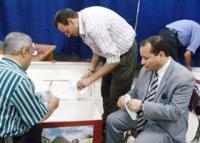Elections for upper chamber of parliament in Egypt turn violent
Elections for Egypt's upper chamber of parliament turned violent as one man was killed in clashes.

Meanwhile, the Muslim Brotherhood, Egypt's largest opposition group, accused the government of arresting some 100 of its members Monday, barring many more from polling stations and rigging the vote, as Brotherhood candidates competed for the first time in Shura Council elections. The government denied the allegations, which the Brotherhood made in a written statement.
Monday's arrests added to the hundreds detained during a monthslong crackdown against the Brotherhood since it announced it would field candidates for the Shura Council, a sharp rebuke to Egyptian President Hosni Mubarak's attempts to limit the Islamic group's political participation.
The Brotherhood, which is Egypt's largest Islamic opposition group, has been banned since 1954 but continues to operate with its lawmakers running as independents in elections.
Violence marred the elections when Ahmed Abdel Salam Ghanim, a supporter of an independent candidate in al-Sharqiya province, was killed in clashes that escalated into gunfire outside a polling station in the town al-Husseiniya, according to state television and police, speaking on customary condition of anonymity.
At another polling station near the country's capital, Cairo, security was heavy, and police kept voters way from the polls.
Although voting officially started at 8:00am (0500 GMT) at the Manshiyat al-Qanater polling station in Giza, where Brotherhood candidate Sayeed Saleh was competing for a seat, police dressed in riot gear sealed off the building and ordered voters to leave the premises.
"It seems that there is no election today," said Alya Lutfi, a 23-year-old accountant standing outside the polling station. "We are not allowed to enter to vote. I don't understand what is going on.
In the district of el-Galatma, in Giza, dozens of voters took to the street to protest alleged government pressure to vote for representatives of the ruling National Democratic Party.
"They (election officials) are trying to force us to vote for the NDP candidate, and we don't want that," said one of the protesters, who would only identify himself as Ayman.
Another voter, Ridha, who also refused to give his last name, confirmed the government pressure and said he saw ballot boxes full of voting cards despite very few voters at the polling station.
Despite these allegations, the Egyptian government said Monday the elections were free from interference.
"We want free and transparent elections, we respect the constitution and the laws and we don't allow any violations in this process," Safawt el-Sherif, speaker of the Shura Council, told state television.
Previous Shura Council elections have witnessed low voter turnout, a reflection of widespread apathy toward the 264-seat consultative body that gained limited legislative powers from recent constitutional amendments.
Only 176 members of the Shura Council are directly elected for six-year terms, while the president appoints the remaining 88. Elections and appointments are executed on a rotating basis, with one half of the council renewed every three years.
In Monday's elections, 587 candidates are competing for 88 seats in 24 provinces, 109 from the ruling NDP, 19 from the Brotherhood and the remainder from smaller opposition groups or running as independents. Two principal opposition parties, al-Wafd and Nasserite, are boycotting the elections.
Egyptian newspapers reported Monday that 11 of the 88 seats were uncontested and went to candidates from the NDP.
Despite the small number of Brotherhood candidates, the group's announcement in April that it would compete for Shura Council elections was significant because it came just three weeks after a controversial constitutional amendment intended to limit the organization's political participation.
Prior to Monday's elections, Egyptian President Hosni Mubarak's party had asked the High Election Commission to disqualify 17 of the Brotherhood's candidates. But the Supreme Administrative Court rejected the request late Sunday.
The ruling party has complained that by sticking to its campaign slogan "Islam is the solution," the Brotherhood is violating the newly amended constitution that prohibits political parties based on religion. The Brotherhood has argued that it is not violating the constitution since article two stipulates that Islamic law is the main source of legislation.
Mubarak's party has an effective monopoly on political power, but has faced an increasing challenge from the Brotherhood, which won nearly a fifth of the seats in the lower house of parliament in 2005. During those elections, the group fielded 160 members and won 88 of the 454 seats, despite mass arrests of Brotherhood members and supporters and attempts to block voters from reaching the polls.
Subscribe to Pravda.Ru Telegram channel, Facebook, RSS!





